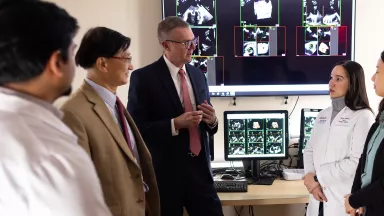Pulmonary Hypertension
At the Montefiore Einstein Center for Heart and Vascular Care, you can access exceptional care for pulmonary hypertension. As a global leader in cardiovascular medicine and surgery, we are an academic based, national and international referral site for high-risk and complex cases. For more than a century, we have been at the forefront in treating heart disease.
Ranked in the top one percent of all hospitals in the nation for Cardiology, Heart & Vascular Surgery according to U.S. News & World Report, our specialists are passionate about uncovering the latest diagnostic approaches and treatments that can improve outcomes. Backed by a multidisciplinary team of specialists, Montefiore Einstein continues to make advances in the treatment of heart disease. In recent years, we have expanded our programs in advanced cardiac imaging, heart failure and interventional cardiovascular medicine and assembled a world-renowned cardiothoracic surgical team.
When you trust us with your care, you can expect compassionate, personalized treatment plans that meet the highest standards for quality and safety. In addition, we offer patients a full choice of support services, from nutritional guidance to rehabilitative therapies.
When you need pulmonary hypertension care, turn to our dedicated providers who will develop a highly personalized treatment plan specific to you.
As part of an academic health system, Montefiore Einstein Center for Heart and Vascular Care supports the mission and guidelines of the U.S. Department of Health and Human Services (HHS). The following information is provided by HHS.
Pulmonary Hypertension – Risk Factors
You may have an increased risk for pulmonary hypertension because of your age, environment, family history and genetic , lifestyle habits, medicines you are taking, other medical conditions, or sex.
Age
Your risk of pulmonary hypertension goes up as you get older, although it may occur at any age. The condition is typically diagnosed between ages 30 and 60.
Environment
You may be at an increased risk of pulmonary hypertension if you have or are exposed to the following:
- Asbestos or silica
- Infection caused by parasites such as schistosomiasis or Echinococcus, which are tapeworms
Family History & Genetics
Certain genetic disorders, such as Down syndrome, congenital heart disease, and Gaucher disease, can increase your risk of developing pulmonary hypertension.
A family history of blood clots or pulmonary embolism also increases your risk of developing pulmonary hypertension.
Lifestyle Habits
Unhealthy lifestyle habits can increase the risk of pulmonary hypertension. These habits include:
- Illegal drugs, such as cocaine and amphetamines
- Smoking
Medicines
Some medicines may increase your risk of pulmonary hypertension, including:
- Chemotherapy medicines to treat cancer, such as dasatinib, mitomycin C, and cyclophosphamide
- Selective serotonin reuptake inhibitors (SSRIs) to treat depression and anxiety. SSRIs may cause pulmonary arterial hypertension in newborns whose mothers have taken these medicines during pregnancy.
- Weight-loss drugs such as fenfluramine and dexfenfluramine, which are no longer approved for weight loss in the United States
Other Medical Conditions
Certain medical conditions may increase your risk of developing pulmonary hypertension:
- Blood clotting disorders, such as blood clots in the lungs, a higher-than-normal platelet count in your blood, and conditions that make your blood more likely to clot, such as protein S and C deficiency, factor V Leiden thrombophilia, antithrombin III deficiency, and antiphospholipid syndrome
- Chronic kidney disease
- Diseases that change the structure of the chest wall, such as scoliosis
- Infections such as hepatitis B or C
- Liver disease such as cirrhosis
- Surgical removal of the spleen
- Thyroid diseases
Sex
Pulmonary hypertension is more common in women than in men. Pulmonary hypertension with certain types of heart failure is also more common in women.
Syndicated Content Details:
Source URL: https://www.nhlbi.nih.gov/subscribe/4218
Source Agency: National Heart, Lung, and Blood Institute (NHLBI)
Captured Date: 2019-01-07 15:32:00.0
Pulmonary Hypertension – Causes
Your genes or other medical conditions can cause pulmonary hypertension. Certain medical conditions can damage, change, or block the blood vessels of the pulmonary arteries. The cause of pulmonary hypertension is not always clear.
To understand pulmonary hypertension, it is helpful to understand the flow of blood through the heart and lungs. The right side of your heart receives oxygen-poor blood from your body’s tissues. The pulmonary arteries connect your right heart and lungs. The heart pumps blood through the pulmonary arteries to the lungs to become oxygen-rich blood. The force or pressure of the blood against the walls of the pulmonary arteries is called the pulmonary pressure.
To learn more, visit How the Lungs Work and How the Heart Works.
Genes
Gene mutations are found in some people who have a family history of pulmonary arterial hypertension. Mutations are also found often in patients who do not have a family history.
Medical Conditions
Many medical conditions can cause pulmonary hypertension. One type of pulmonary hypertension—called pulmonary arterial hypertension—is caused by conditions that result in narrowing of the pulmonary arteries themselves, such as scleroderma or HIV. Narrowed blood vessels can increase blood pressure in the lungs.
Medical conditions that can cause pulmonary hypertension include:
- blood clot in the lungs, called pulmonary embolism, a type of venous thromboembolism (VTE)
- Chronic exposure to high altitude
- Chronic kidney failure
- Congenital heart defects or congenital narrowing of the pulmonary arteries
- Connective tissue diseases, such as scleroderma
- HIV
- Infection with parasites, such as schistosomiasis or Echinococcus, which are tapeworms
- Left heart diseases, such as left heart failure, which may be caused by high blood pressure throughout your body or ischemic heart disease; and heart valve diseases, such as aortic stenosis and mitral valve disease
- Liver diseases, such as cirrhosis, that lead to higher-than-normal blood pressures in the liver
- Lung diseases, such as chronic obstructive pulmonary disease (COPD), interstitial lung disease, or sleep apnea
- Metabolic disorders, such as thyroid disorders or Gaucher disease
- Sarcoidosis
- Sickle cell disease
- Tumors in the lungs
Look For
Treatment will discuss medicines and procedures that your doctors may recommend if you are diagnosed with pulmonary hypertension.
Syndicated Content Details:
Source URL: https://www.nhlbi.nih.gov/subscribe/4211
Source Agency: National Heart, Lung, and Blood Institute (NHLBI)
Captured Date: 2019-01-07 15:32:00.0
Pulmonary Hypertension – Treatment
If you are diagnosed with pulmonary hypertension, your doctor will determine your treatment plan based on the cause of disease, if it is known. Your doctor may recommend healthy lifestyle changes, medicines, or other treatments aimed at keeping your symptoms from getting worse, increasing your ability to exercise, improving heart function, and ensuring a better quality of life. There is no cure for pulmonary hypertension unless chronic blood clots in the lungs are the cause.
Healthy Lifestyle Changes
Depending on the cause of your pulmonary hypertension, your doctor may recommend healthy lifestyle changes.
- Heart-healthy eating, which includes eating less salt, to lower blood pressure or cholesterol if high levels of these contributed to the cause of your pulmonary hypertension. Eating less salt will help control your body fluids and may improve heart function.
- Physical activity as recommended and supervised by your doctor
- Physical rehabilitation to improve your ability to exercise and also boost your quality of life
Medicines
Medicines to treat pulmonary hypertension may include:
- Anticoagulation or blood thinners to prevent blood clots in people whose pulmonary hypertension is caused by chronic blood clots in the lungs. These thinners also can help some people who have pulmonary arterial hypertension, heart failure, or other risk factors for blood clots.
- Digitalis, or digoxin to control the rate blood is pumped throughout the body.
- Vasodilator therapy to relax blood vessels and lower blood pressure in the pulmonary artery most affected in people who have pulmonary arterial hypertension. This includes calcium channel blockers such as nifedipine and diltiazem, as well as newer groups of medicines called endothelin receptor antagonists and phosphodiesterase type 5 inhibitors.
Procedures & Therapies
Your doctor may recommend a procedure, surgery, or therapy to treat pulmonary hypertension.
- Oxygen therapy if oxygen levels in the blood are too low.
- Balloon atrial septostomy to decrease pressure in the right heart chambers and improve the output of the left heart and oxygenation of the blood. In this procedure, a small hole is made in the wall between the right and left atria to allow blood to flow from the right to the left atrium.
- Balloon pulmonary angioplasty to lower the blood pressure in your pulmonary artery and improve heart function in people who cannot have a pulmonary endarterectomy.
- Pulmonary endarterectomy surgery to remove blood clots from the inside of the blood vessels of the lungs.
Treatments for other conditions
Your doctor may recommend medicines or procedures to treat the condition that is causing your pulmonary hypertension.
- Blood pressure medicines such as angiotensin-converting enzymes inhibitors, beta blockers, or calcium channel blockers when left heart disease is the cause
- Blood transfusions or hydroxyurea to treat sickle cell disease
- Heart valve repair
- Iron supplements to increase blood iron levels and improve anemia
Look for
- Research for Your Health will discuss how we are using current research and advancing research to treat people with pulmonary hypertension.
- Participate in NHLBI Clinical Trials will discuss our open and enrolling clinical studies that are investigating treatments for pulmonary hypertension.
- Living With will discuss what your doctor may recommend, including lifelong lifestyle changes and medical care to prevent your condition from recurring, getting worse, or causing complications.
Syndicated Content Details:
Source URL: https://www.nhlbi.nih.gov/subscribe/4227
Source Agency: National Heart, Lung, and Blood Institute (NHLBI)
Captured Date: 2019-01-07 15:32:00.0
Pulmonary Hypertension – Signs, Symptoms, and Complications
Signs and symptoms of pulmonary hypertension are sometimes hard to recognize, because they are similar to those of other medical conditions. People may have symptoms for years before being diagnosed with pulmonary hypertension. These symptoms may get worse over time and could eventually lead to serious complications such as right heart failure.
Signs & Symptoms
Signs and symptoms of pulmonary hypertension may include the following:
- Chest pain
- Cough that is dry or may produce blood
- Fatigue
- Hoarseness
- Light-headedness, fainting, or dizziness
- Nausea and vomiting
- Shortness of breath, first with physical activity and then without it as the disease gets worse
- Swelling of your abdomen, legs, or feet caused by fluid buildup
- Weakness
- Wheezing
Complications
Complications of pulmonary hypertension may include the following:
- Anemia
- Arrhythmias and bundle branch blocks of the heart
- Blood clots in the pulmonary arteries
- Bleeding in the lungs, which may be life-threatening
- Heart failure, especially right ventricular failure
- Liver damage from increased pressure in the right heart
- Pericardial effusion, which is a collection of fluid in the sac-like structure around the heart
- Pregnancy complications that can be life-threatening for the mother and baby
Look for
- Diagnosis will discuss tests and procedures used to detect signs of pulmonary hypertension and help rule out other conditions that may mimic pulmonary hypertension.
- Treatment will discuss treatment-related complications or side effects.
Syndicated Content Details:
Source URL: https://www.nhlbi.nih.gov/subscribe/4221
Source Agency: National Heart, Lung, and Blood Institute (NHLBI)
Captured Date: 2019-01-07 15:32:00.0





